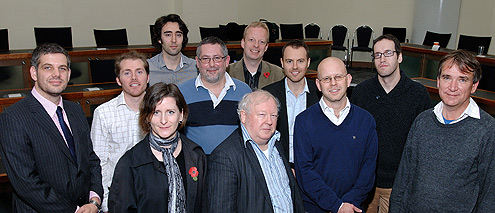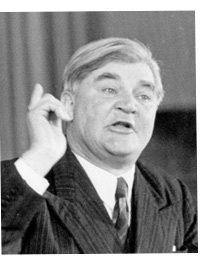The power of speech
Wed, 23 Nov 2011 09:47:00 GMT

Pictured at the Labour Orators Conference are (l-r) Dr Tim Heppell, Dr David Stewart, Dr Judi Atkins, Dr David Moon, Dr Mick Hill, Professor Keith Laybourn (bottom centre), Dr Robin Pettitt (top centre), Dr Richard Hayton, Dr Mark Bennister, Dr Andrew S Crines , Dr Mark Garnett.
IN an age of soundbites and autocues, oratory might have changed, but it is still a vital part of British politics.
That is one of the conclusions which emerged from a University of Huddersfield conference at which some of the country’s leading political historians analysed the oratorical styles of a sequence of post-war Labour figures – from Aneurin Bevan in the 1950s to Gordon Brown in our own time.
The conference organisers were Dr Andrew Crines and Dr Richard Hayton, who teach and research in the areas of political science at the University of Huddersfield.
“Oratory is not dead. It’s just different,” said Dr Crines, whose research focuses on the oratorical impact of individuals upon British politics.
 Changes in oratorical styles over the decades – from the impassioned rhetoric of Nye Bevan (pictured left)to the conversational approach of Tony Blair – partly resulted from changing expectations of the audience, added Dr Crines.
Changes in oratorical styles over the decades – from the impassioned rhetoric of Nye Bevan (pictured left)to the conversational approach of Tony Blair – partly resulted from changing expectations of the audience, added Dr Crines.
One of the motivations behind the Labour Orators Conference was to lend weight to an argument that individual oratory was still important in British party politics. There are plans for a follow-up event dealing with post-war Conservative politicians, but oratory was especially important in the Labour Party because it was seen as the most collectivist party said Dr Crines.
Also, Labour orators were more concerned with issues of ideology and group affiliation within the party, whereas Tories tended to use oratory to secure power or demonstrate their leadership skills.
The Labour Orators Conference began with a contribution by the University of Huddersfield’s Professor Keith Laybourn, a leading historian of Labour, who analysed the legacy of Aneurin Bevan, whose oratory “left its mark on British and international politics”.
 But Professor Laybourn acknowledged that Bevan was not the most successful of twentieth century politicians – “many with less ability have achieved more”.
But Professor Laybourn acknowledged that Bevan was not the most successful of twentieth century politicians – “many with less ability have achieved more”.
And Dr Crines comments that good platform skills may not always lead to policy success. “You can be an excellent orator and yet have very little policy impact. After 1983, Tony Benn’s influence on policy was minimal, even though his oratory remained impressive.”
Nine experts from seven universities contributed to the conference. They included the universities of Leeds, Liverpool and Lancaster. The full roster of Labour politicians under analysis was Aneurin Bevan, High Gaitskell, Harold Wilson, Michael Foot, Tony Benn, Neil Kinnock, John Smith, Tony Blair and Gordon Brown (pictured right).
There are plans to make contributions to the conference into the basis for a book on the subject of Labour orators, with a follow up conference on the Conservative Party also in the developmental stages.







